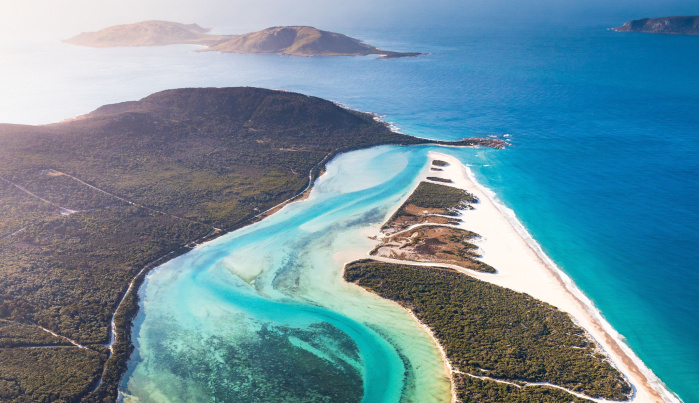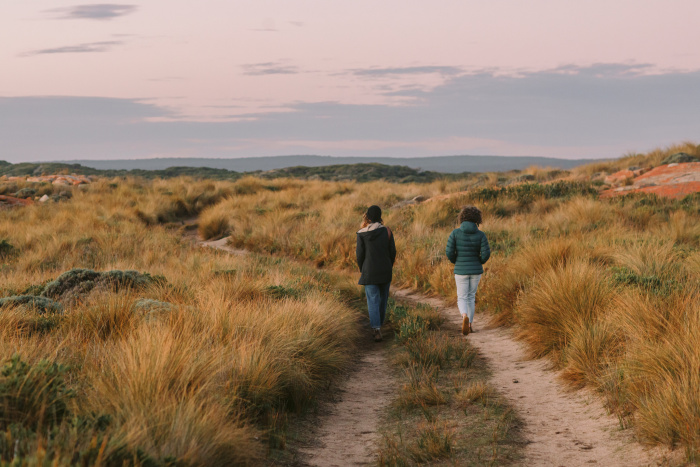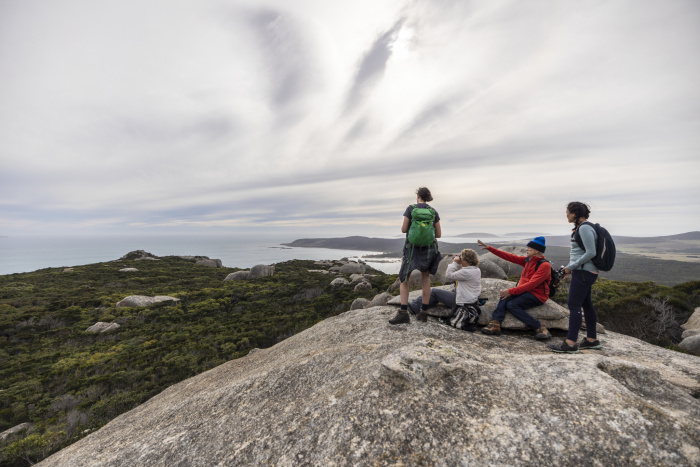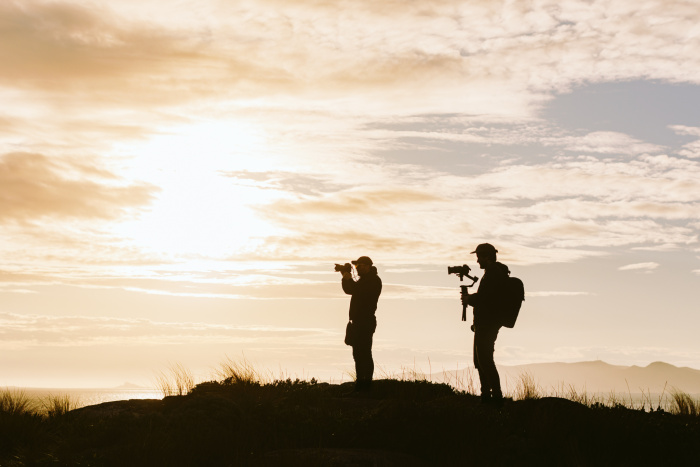Image credit: Sean Scott | Wombat Flinders Island
What makes Flinders Island unique?
The tiny island community of approximately 950 residents warmly welcomes visitors but with a cautionary word to put your responsible traveller hat on before you leave home. Being an island with a small community it faces a range of social and economic challenges. Flinders Island is different and for this reason the community extend a different invitation to visitors.

Image Credit: Luke Tscharke | Aerial North East River Flinders Island
For an unforgettable time on Flinders Island, learn to be one of us for a few days, a week, or the rest of your life. Slow down, get lost, co-contribute, connect. Don't try to change this place. Let this place change you.

Image: Brand Tasmania | Credit: Fred and Hannah | Flinders Island
What can you do to prepare for your visit to Flinders Island?
Knowing the importance of protecting Flinders Island and contributing to the community, you're probably thinking 'what can I do to support this during my visit?'. To help you get started we have put together a list of a few simple things you can do to prepare for your visit and to consider during your time on Flinders Island.
1. Waste - consider what you bring to the island and how this will contribute to the waste you leave behind? For example: if you are bringing a new shaving razor, remove it from packaging prior to travel; medication, take the empty blister packs with you at the end of your visit so they can be recycled when you return home.
2. Setting realistic expectations. You won't find a 24-hour store on Flinders Island and the duration of opening hours for many businesses, such as cafes and restaurants may be different to what you are used to. Expecting to see the same services as you will find in a capital city places stress on your hosts - take the opportunity to step back to a simpler way of life.
3. Caring for wildlife. There is an abundance of wildlife on Flinders Island and this is particularly evident at dusk, during the night and at dawn - avoid driving at these times if you can, and if you are driving slow down to minimise the risk of a collision with native animals. Despite being cautious, sometimes injury to an animal is unavoidable, so familiarise yourself with the contact number for wildlife rescue so you can seek care for the animal.
4. Food supply. If you are planning on mixing things up during your stay by self-catering on some days, start making a list of what you might need and in what quantity especially if you are travelling in a larger group. If there are specific items you need to cater for dietaries, it is worthwhile checking ahead with the local supermarket to see if they stock these items and likewise if you anticipate that you will need large quantities of some items as resupply to the island is on a weekly basis and a few big shopping trips can quickly see the shelves depleted.
5. Support local. Make the most of your visit to Flinders Island and support local businesses by dining out a few times during your stay, visit a local winery, distillery, buy local crafts, local produce, take a tour and maybe even ask the locals if there is a community activity you can join in on during your stay.
6. Environment. Stick to the path well worn. Get out and explore but do this mindfully taking care not to disturb wildlife, such as bird nesting areas. Remember these wise words: leave only footprints and take only photos.
7. The Wave. There is an unwritten road rule on Flinders Island and it speaks to strong community ties. When driving you will quickly notice that the driver of a passing vehicle will wave to you - wave back and take a moment to reflect on how nice it is that someone takes the time to acknowledge others.
8. Medication. Take sufficient medication for the duration of your stay on Flinders Island. While there is a pharmacy and medical services on the island, you don't want to find yourself in urgent need of something that there may not be enough supply of to meet the needs of residents and visitors.
9. Keep cups. This is the perfect way to make sure you aren't creating unnecessary waste. Plastic water bottles and take-away coffee cups add up quickly and it's not just good for Flinders Island, it's good for the world!
10. Know where you are staying. Some regions of Flinders Island have no food, drinks or fuel available so it is important to check the location of where you are staying and determining your nearest services, plan what to take with you because a quick dash to a 24-hour convenience store is just not possible.

Image credit: Stu Gibson | Flinders Island
Take a breath, slow down!
As your feet leave the ground and you soar into the sky and onward to your Flinders Island adventure, make a promise to yourself to leave your daily routine behind and a pledge to take a deep breath, pause and slow down to island time.
During your visit chat to the locals and see if there is a community project that you can join in on - it's a great way to learn a new skill, contribute to the community in a positive way and take home some wonderful memories.

Image: Brand Tasmania | Credit: Fred and Hannah | Flinders Island
Hosting Visitors The Islander Way
It has been identified that the island must guard against over-tourism and pave the way to educate and advocate for responsible and mindful tourism practices that benefit both the environment and local communities. The Islander Way aspires to connect with visitors who align to the community values, understanding the community's profound sense of belonging and who will contribute to building a new relationship between the community and tourism for the benefit of future generations and protection of the island and it's way of life.
Being an island with a small community it faces a range of social and economic challenges to deliver and manage services that happen in a routine manner and go somewhat unnoticed in big cities - waste removal, food security, limited business infrastructure, frequency and cost of freight, transport and fuel, and limited workforce are just a few of these.
Our vision is to host visitors who connect, respect, and support our Island communities, and contribute to the well-being of our people, place, and environment.